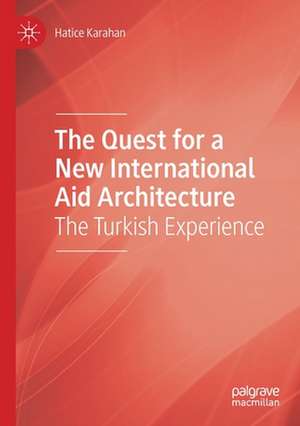The Quest for a New International Aid Architecture: The Turkish Experience
Autor Hatice Karahanen Limba Engleză Paperback – 2 aug 2021
The book aims to provide the reader with an understanding of Turkey’s significant value-added contribution to the international aid architecture, gives an outline for international cooperation, and contributes to ongoing discussions within development economics, political science, and international relations.
Preț: 386.39 lei
Nou
Puncte Express: 580
Preț estimativ în valută:
73.93€ • 77.40$ • 61.18£
73.93€ • 77.40$ • 61.18£
Carte tipărită la comandă
Livrare economică 07-21 aprilie
Preluare comenzi: 021 569.72.76
Specificații
ISBN-13: 9783030504441
ISBN-10: 3030504441
Pagini: 262
Ilustrații: XXI, 262 p. 17 illus.
Dimensiuni: 148 x 210 mm
Greutate: 0.38 kg
Ediția:1st ed. 2020
Editura: Springer International Publishing
Colecția Palgrave Macmillan
Locul publicării:Cham, Switzerland
ISBN-10: 3030504441
Pagini: 262
Ilustrații: XXI, 262 p. 17 illus.
Dimensiuni: 148 x 210 mm
Greutate: 0.38 kg
Ediția:1st ed. 2020
Editura: Springer International Publishing
Colecția Palgrave Macmillan
Locul publicării:Cham, Switzerland
Cuprins
1. Introduction.- 2. Sub-Saharan Africa: Understanding the ongoing poverty.- 3. The international aid architecture: What to do for better results?.- 4. Focusing on specific needs of development.- 5. Turkey's foreign aid perspective: A framework.- 6. The Somali famine.- 7. The misery of Palestinian people.- 8. Hosting Syrian refugees.- 9. Lending a helping hand to Rakhine.- 10. Getting out of the vicious circle: A fundamental discussion.- 11. Afghanistan, the UN and Turkey.- 12. Turkey's initiative in Africa.- 13. Contemporary footprints on the Silk Road.- 14. Cooperation in the Black Sea Basin.- 15. Catalyzing peace in the Balkans.- 16. Standing for stability in the Middle East.- 17. Conclusion.
Notă biografică
Dr. Hatice Karahan is a Professor of Economics, and heads the Department of Economics and Finance at Istanbul Medipol University. She also serves in the President’s Office of the Republic of Turkey as a senior economic advisor. Karahan received her PhD degree in Economics from Syracuse University in 2006.
Textul de pe ultima copertă
This book examines Turkey’s success within international development cooperation and how this could create a framework for a new international aid architecture. Turkey has become a world leader in humanitarian assistance and shared an extraordinary burden in official development assistance (ODA). Its achievements are used to highlight the global failure to meet aid commitments and the increasingly permanent humanitarian problems seen in certain regions. A particular focus is given to Turkey’s diplomatic and humanitarian actions, its contribution to regional stability and development, and creating a holistic aid perspective.
The book aims to provide the reader with an understanding of Turkey’s significant value-added contribution to the international aid architecture, gives an outline for international cooperation, and contributes to ongoing discussions within development economics, political science, and international relations.
Dr. Hatice Karahan is a Professorof Economics, and heads the Department of Economics and Finance at Istanbul Medipol University. She also serves in the President’s Office of the Republic of Turkey as a senior economic advisor. Karahan received her PhD degree in Economics from Syracuse University in 2006.
The book aims to provide the reader with an understanding of Turkey’s significant value-added contribution to the international aid architecture, gives an outline for international cooperation, and contributes to ongoing discussions within development economics, political science, and international relations.
Dr. Hatice Karahan is a Professorof Economics, and heads the Department of Economics and Finance at Istanbul Medipol University. She also serves in the President’s Office of the Republic of Turkey as a senior economic advisor. Karahan received her PhD degree in Economics from Syracuse University in 2006.
Caracteristici
Focuses on aid activities from a developing economy, rather than the developed countries that are traditionally studied Follows an interdisciplinary approach and gives an international perspective on aid Discusses the role of international leadership and avenues of future cooperation
